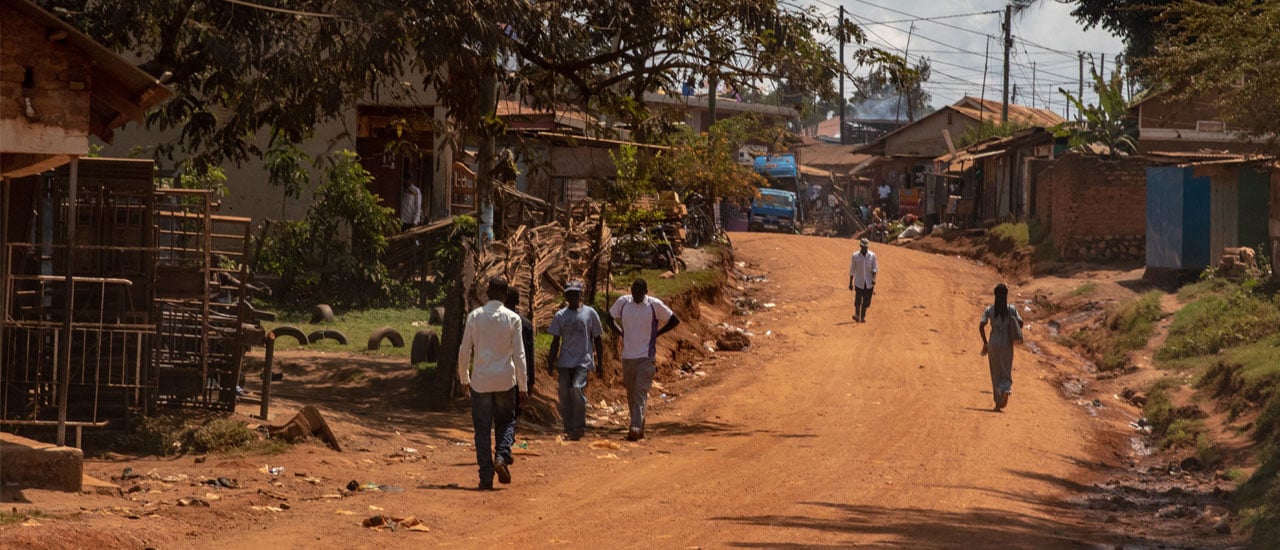
Road in Uganda. Credit: LSHTM
PARES
Building Partnerships for Resilience: strengthening grassroots response to public health crises
PARES is a NIHR funded consortium of partners from Africa and Europe, dedicated to researching and building partnerships for resilient responses to public health crises. Through research and co-production we are identifying best-practices and developing indicators for engaging communities in crisis-response.
We have seven research, engagement and learning work packages to strengthen the evidence base for how to improve effective community-led responses to environment-related public-health crises.
Our partners are based in Ethiopia, Madagascar, Sierra Leone and Uganda, working with grassroots communities and frontline health-workers.
Recent updates
Events
Newsletter
Contact us
Faculty of Public Health and Policy
London School of Hygiene & Tropical Medicine
United Kingdom
Associate Professor Freddie Sengooba
Makerere School of Public Health
Makerere University
Uganda
The aim of PARES is to develop and strengthen the evidence base for how to improve effective community-led responses to environment-related public-health crises.
Social science work has shown that resilience for responding to such shocks is most effectively built at community level. However, no good quality data exist on the mechanisms by which effective health responses to crises can be built.
PARES will gather evidence and develop best-practice with local partners in Ethiopia, Madagascar, Sierra Leone and Uganda, who have experienced – and responded to – a range of public health crises, including drought, food insecurity, extreme weather events, zoonotic and other infectious disease outbreaks.
Central to our approach is the “co-production” of research actions with affected communities.
Recent updates
Events
Newsletter
Contact us
Faculty of Public Health and Policy
London School of Hygiene & Tropical Medicine
United Kingdom
Associate Professor Freddie Sengooba
Makerere School of Public Health
Makerere University
Uganda
We are a dynamic, interdisciplinary team with excellent complementary skills across six countries encompassing clinical expertise including in zoonotic, emerging and other infectious diseases, health policy and systems, anthropology and sociology, environmental sciences, knowledge and learning technologies.
Our partnership consists of:
- UK: London School of Hygiene & Tropical Medicine (LSHTM): Susannah Mayhew, Dina Balabanova, Mateus Sahani
- Uganda: Makerere University: Freddie Ssengooba, Justine Namakula, Revocatus Twinomuhangi, Adelaine Aryaija-Karemani, Hakimu Sseviiri
- Sierra Leone: Njala University and Eastern Polytechnic: Lawrence Babawo, Ahmed Vandi, Esther Mokuwa, Paul Richards, Mohamed Ambrose Koroma, Rashid Amzak Kpaka, Marion Nyakoi, Joseph Christian Mboma
- Madagascar/UK: Blue ventures: Vik Mohan, Edith Ngunjiri
- Ethiopia: Jimma University: Mirkuzie Woldie, Negalign Berhanu, Diribe Makonene, Gelila Abraham
- The Netherlands: Wageningen University: Harro Maat, Sander Koenraadt
Recent updates
Events
Newsletter
Contact us
Faculty of Public Health and Policy
London School of Hygiene & Tropical Medicine
United Kingdom
Associate Professor Freddie Sengooba
Makerere School of Public Health
Makerere University
Uganda
Our research objectives and associated work packages are:
- Objective 1: Synthesise evidence on how communities, local health systems and other formal and informal entities have responded to health crises, and with what effect
WP1: Narrative synthesis reviews of literature on community-responses to global health shocks, (environmental and climatic changes affecting livelihoods; changing vector-borne disease patterns; increases in emerging infections and zoonotic disease outbreaks).
WP2: analysis of secondary datasets held by PARES partners on local perspectives and responses to different public health and related environmental shocks across settings.
- Objective 2: Develop effective approaches for public health crisis-response at grassroots, and indicators to measure these
WP3i: Identify common principles for effective responses (from Evidence Synthesis data) for community-led approaches effective in reducing disease, changing behaviour & building resilience for responding to health crises.
WP3ii: Finalise evaluation indicators – agree indicators for assessment of models and prototypes in WP4, based on analysis from WP1, 2 and 3i.
WP3iii: Develop evidence-based prototypes of effective community-policy engagement approaches to inform policy decisions.
- Objective 3: Test these approaches for effective community-led responses to public-health crises
WP4: Case study evaluations of models of community-led responses to public health crises, identified by partners and during Obj1 synthesis as innovative and effective. These may be retrospective (e.g. recent responses to Covid19) or prospective (e.g. where disease outbreaks occur). They may include analyses of social innovations, science shop approaches and others. Data will be collected on: processes, interactions, flows of information and evidence on which action is based, epidemiological trajectories. Models will be assessed against the indicators developed in WP3ii and findings will further inform the prototypes.
WP5: Prospectively test, evaluate and refine evidence-based prototype approaches to community-led crisis-response. We will use quasi-experimental/natural experiments implemented with responsive-mode funding as outbreaks or health-crises occur (see Methods below). We will determine impact in terms of process and health outcomes, using our evaluation framework (WP3ii).
- Objective 4: Formulate guidance and create dialogue with stakeholders on how to strengthen local resilience for effective responses to public health crises
WP6: National, regional and global events including NIHR’s SLACK platform, to disseminate Prototype Approaches and Principles and maximise uptake.
- Objective 5: Strengthen and consolidate sustainable partner research and management capacities to strengthen policy and practice in crisis-response
WP7: Develop and deliver capacity building and training plan for partners and stakeholders.
Recent updates
Events
Newsletter
Contact us
Faculty of Public Health and Policy
London School of Hygiene & Tropical Medicine
United Kingdom
Associate Professor Freddie Sengooba
Makerere School of Public Health
Makerere University
Uganda
Recent updates
Events
Newsletter
Contact us
Faculty of Public Health and Policy
London School of Hygiene & Tropical Medicine
United Kingdom
Associate Professor Freddie Sengooba
Makerere School of Public Health
Makerere University
Uganda




